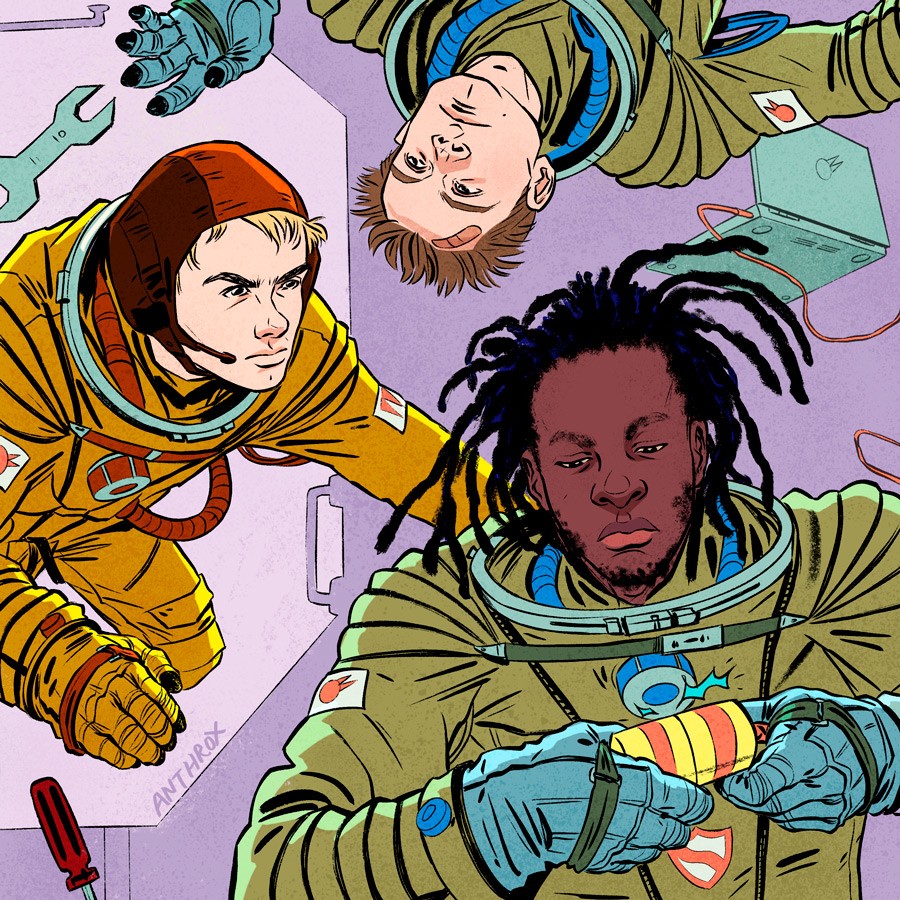Morgan Simpson, Matt Kwasniewski-Kevin, Geordie Greep and Cameron Picton all met as students of the BRIT school. Tucked into an enclave in South London, the school is better known for breeding singers such as Adele rather than genre-defying guitar bands. The quartet nevertheless came together as a band attending jam sessions separately before adding Picton on bass. Once their lineup was completed they played their first gig at The Windmill in Brixton before going on to perform there regularly.
Schlagenheim, the celebrated Black Midi debut, was released in June 2019, following signing to Rough Trade records. Aptly dubbed ‘counter-programming’ by Pitchfork the album brought free improvisation to different heights of ‘clattery racket’, as termed by the Guardian. Typically unstructured and notoriously difficult to describe, Black Midi seemed to view their songs as collections of riffs and noises rather than typical choruses comprising tunes. Their debut single bmbmbm was tempered by samples of Nikki Grahame (a Big Brother contestant), and their influences seemed as bizarre as the futile attempts by critics to pinpoint them, and other British bands seemingly coming together at this moment in time to make music as weird as possible, into a single genre.
Their new album Cavalcade was primarily recorded in the summer of 2020 and without Matt Kwasniewski-Kevin who decided to take a break from all band activities due to mental health issues. Whilst Schlagenheim took an improvised approach, Cavalcade was touted as being more premeditated, an interesting turn for a band that are known for their 9 minute long freewheeling instrument clashes.
Creating the record
Sitting on Zoom with Picton he tells me the new album “is a lot more dynamic in both a literal and figurative sense.”
“The first record there was quite alot of compression. Emotionally as well, there’s alot more highs and lows. All the crazy bits are crazier and all the sweeter bits are way sweeter. It’s just a lot more.”
The second track, after a short Intro, John L seems to confirm Picton’s summary. Pure chaos and looping chords mean that by its crescendo end, the song feels anthem-like. The lyrics, which are delivered in a spoken-word style spins a tale of a society that have succumbed as a cult leader that takes control of a population.
Slow also oscillates between calm and chaos, skittish and full of guitars and fast drums the track represents the band’s absurdity. The tempo shifts and general pandemonium are combined with spoken word poetry.
Marlene Dietrich is where the listener starts to see how the band have changed their approach, with interesting results. Initially more romantic and slow, showcasing the range of the quartet the lyrics glide more calmly through the track, which is more ‘sung’ than their other releases. The lyrics reference German-born wartime singer Dietrich and are as cryptic as their other lyrics, bringing in obscure references to create a unique song that almost defies listeners’ expectations in its calmness, compared to the band’s other tracks.
Picton continues “That, (the intensity) was one of the things that we spoke about beforehand. Before we went in, we wanted it to have loads of peaks and troughs and lots of difference between each track.”
The album was recorded in the summer of the first lockdown, half conceived in isolation and cemented in the studio. “I’m pretty sure we were all in our rooms, just fiddling about with guitars and stuff. We were just writing in general, making whatever we wanted to make at the time and sending it to each other.” For a band that is infamous for its improvisation during live shows, the lack of touring is enough to bring out different and potentially unexpected sides to their music.
Once back in a room together the quartet worked out how to play the songs together instrumentally. Particularly for Diamond Stuff, completed at the end of June, where guitar reigns over lyrics, the four created the instrumental by working off each other in a studio environment.
For Picton, not being able to tour and travel during the lockdown was frustrating, but gave the band an opportunity to sit down and reassess what they actually wanted to do post a year of relentless touring after releasing Schlagenheim. After the first lockdown, Black Midi sat down together in June and improvised, playing music and showing each other new lyrics for the first time in a while.
“This was a lot more playing music with a purpose, as well as having fun and enjoying each other’s company.”
After playing together in the summer the band weren’t able to rehearse over the winter due to the second lockdown. Being in isolation however wasn’t all bad, for the record the band brought together parts individually that might not have grown through purely collaborative work.
“There was alot of really different stuff, stuff we wouldn’t have done before, like tracks without drums or with very simple drum parts. It’s stuff we wouldn’t have been able to do as we wouldn’t have had the time to just sit in our bedrooms for weeks, normally.”
Looking ahead

Photo by Anthrox Studios
More than anything, Black Midi are a band that begged to be seen live. Cavalcade, despite its differences to Schlagenheim, is once again anything but “sitting down” and relaxing music for the average listener. Many tracks were written during touring as well. As they were recording the album the band didn’t know when they would play again. “We just wanted the album to sound as good as we wanted it to, and not necessarily about playing it live, we thought we would cross that bridge when we came to it, and focus on making the best record possible.” Perhaps this is the most interesting aspect of Cavalcade, how a band that take improvising to a new level made a fantastic record in a context where there were barriers to being in the same physical space as each other.
Picton shrugs and hopes that people will simply enjoy the record. “The thing about the record is that every track is character-based, rather than the previous record where you had only a handful of character-based tracks and the lyrics were more impersonal. Most of the lyrics are about specific characters and hopefully will have some kind of emotional resonance. It would be nice if people wanted to stick with it a bit, and get lost in that world.”
And while the world is slowly opening up again, Black Midi‘s frantic and fearless sound seems to arrive just in time to cope with everything. They remain one of music’s most adventurous and risk-taking groups right now and we can only hope that this is a pit stop in an exciting journey we will continue to monitor, no matter what happens.
Cavalcade is out on May 28 via Rough Trade Records and Black Midi also playing a tour towards the end of the year.



